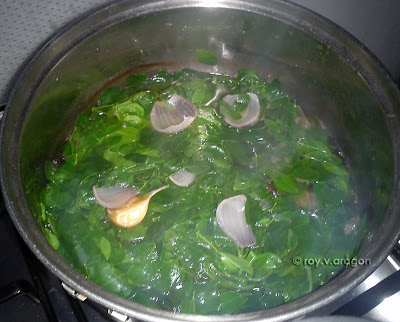From time to time, as a respite, I'll be featuring some "guest" articles here, like this one about home-cooked meals, relevant to our quest for a more healthy lifestyle.
 |
| Dinengdeng a marunggay being cooked at home. (click on photo for a larger view) |
The study, recently published in Public Health Nutrition by researchers from Monash University, the National Defense Medical Centre, Taiwan and the National Health Research Institutes, Taiwan, found that people who cooked at home at least five times a week were 47 per cent more likely to still be alive after 10 years.
The ten-year study looked at the cooking habits of Taiwanese living independently aged over 65 years. Of the participants, 31 per cent reportedly prepared meals at home at least five times per week, 17 per cent cooked no more than twice a week, 9 per cent cooked at home three to five times per week, while the remainder (43 per cent) reported that they never cooked at home.
 |
| Authentic home-cooked dinengdeng: string beans, lima/broad beans, pigeon peas, marunggay, and grilled bangus. (click on photo for a larger view) |
When researchers followed up ten years later, they found of the surviving participants that frequent cooking was a significant factor in their health and long life.
Lead author, Emeritus Professor Mark Wahlqvist from Monash University’s Asia Pacific Health and Nutrition Centre at the Monash Asia Institute, said those who cooked more often had a better diet.
“We found those that cooked more frequently had a better sense of nutritional knowledge than those who didn’t,” Emeritus Professor Wahlqvist said.
 |
| Authentic home-cooked dinengdeng: alukon, langka, marungay, kabatiti, sabong-karabasa, patani. Photo by James V. Felipe (click on photo for a larger view) |
“Cooking is an activity that requires both good mental and physical health. Besides the health benefits the actual cooked meal provides, there are other physiological benefits obtained from its production, purchase, preparation and eating, especially with others.”
The researchers found that dietary diversity was also associated with greater survival rates amongst the participants.
“We found that those who cooked more frequently had a better diet and more favourable nutrient densities,” Emeritus Professor Wahlqvist said. "It is therefore possible that cooking is related to longevity through food choice and quality.”
 |
| Authentic home-cooked chicken tinola with paria leaves. Photo by Gina Bumatay Cayanan. (click on photo for a larger view) |
Nutrient density is the ratio of nutrient content (in grams) to the total energy content (in kilocalories or joules).
The results also indicated women lived longer than men when there was a need to cook for a spouse, suggesting that women are more likely to find physiological health benefits from the pleasure in cooking for others.
(Source: http://www.monash.edu.au/news/show/home-cooked-meals-add-to-life-expectancy)














0 comments:
Post a Comment